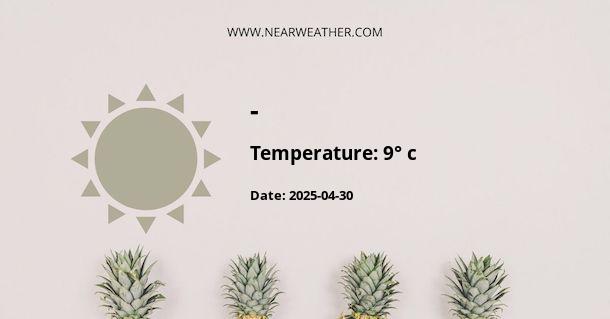Climate and Weather in Russia
Russia is the largest country in the world, covering a vast area spanning two continents, Europe and Asia. As such, it experiences a wide range of climates and weather patterns throughout its various regions. From the freezing temperatures of Siberia to the mild and temperate climate of the Black Sea coast, Russia offers a diverse climate experience. Let's take a closer look at the different climatic zones and the weather conditions you can expect in Russia throughout the year.
1. Continental Climate in Central Russia
The central part of Russia, including the capital city Moscow, has a continental climate characterized by distinct seasons. Summers are warm and humid, with average temperatures ranging from 20 to 25 degrees Celsius (68 to 77 degrees Fahrenheit). Winters, on the other hand, are cold and snowy, with temperatures dropping well below freezing. The average winter temperature in Moscow is around -10 degrees Celsius (14 degrees Fahrenheit), but it can often reach even lower temperatures.
The annual precipitation in central Russia is relatively evenly distributed throughout the year, with slightly higher rainfall in the summer months. Snowfall is common during the winter season, with the city of Moscow receiving an average of 50 centimeters (20 inches) of snow per year.
2. Arctic Climate in Siberia
Siberia, located in the northeastern part of Russia, is known for its extreme cold temperatures and harsh winters. The region has an arctic climate, with long, bitterly cold winters and short, cool summers. In the winter, temperatures can plummet to -30 degrees Celsius (-22 degrees Fahrenheit) or even lower, making it one of the coldest inhabited places on Earth.
Summers in Siberia are short but can be surprisingly warm, with average temperatures ranging from 15 to 25 degrees Celsius (59 to 77 degrees Fahrenheit). However, even during the summer months, the nights can still be chilly. Precipitation in Siberia is relatively low, with most of it occurring during the summer as rain.
3. Subarctic Climate in Northern Russia
Northern Russia, including regions such as Murmansk and Arkhangelsk, experiences a subarctic climate. This means long, cold winters and short, cool summers. Winter temperatures can drop to -20 degrees Celsius (-4 degrees Fahrenheit) or lower, and snow cover is common for several months. Summers are mild, with average temperatures ranging from 10 to 15 degrees Celsius (50 to 59 degrees Fahrenheit).
Precipitation in northern Russia is relatively high, with frequent snowfall during the winter months. The region is also known for its strong winds and occasional storms, especially along the coast.
4. Maritime Climate in the Black Sea Region
The Black Sea region of Russia, including cities like Sochi and Anapa, has a maritime climate influenced by the warm waters of the Black Sea. This results in mild winters and warm summers, making it a popular tourist destination. Winter temperatures rarely drop below freezing, with average temperatures around 5 degrees Celsius (41 degrees Fahrenheit). Summers are pleasantly warm, with average temperatures ranging from 25 to 30 degrees Celsius (77 to 86 degrees Fahrenheit).
While the Black Sea region experiences relatively high precipitation throughout the year, the summer months tend to be drier compared to the rest of the year. The region is also prone to thunderstorms during the summer season.
5. Tundra Climate in Far Northern Russia
The far northern parts of Russia, including the Arctic islands and the northernmost regions of the mainland, have a tundra climate. This means extremely cold temperatures and a short, cool summer. Winter temperatures can drop well below -30 degrees Celsius (-22 degrees Fahrenheit), and the region is covered in snow and ice for most of the year.
The summer season in the tundra is brief, with average temperatures ranging from 5 to 10 degrees Celsius (41 to 50 degrees Fahrenheit). Despite the cold temperatures, the region experiences the phenomenon of the midnight sun during the summer months, where the sun remains above the horizon for 24 hours.
Conclusion
With its vast size and diverse geography, Russia offers a wide range of climates and weather patterns throughout its various regions. From the freezing temperatures of Siberia to the mild and temperate climate of the Black Sea coast, visitors to Russia can experience a variety of weather conditions depending on their destination and the time of year. Whether you prefer the snowy winters of Moscow or the warm summers of Sochi, Russia has something to offer for every weather enthusiast.
A - -'s Latitude is 44.304443 & Longitude is 40.099167.
A - Weather in - is -5° today.
A - Climate Conditions in - shows light snow today.
A - Humidity in - is 92% today.
A - Wind speed in - is 6.3 km/h, flowing at 4° wind direction. today.
